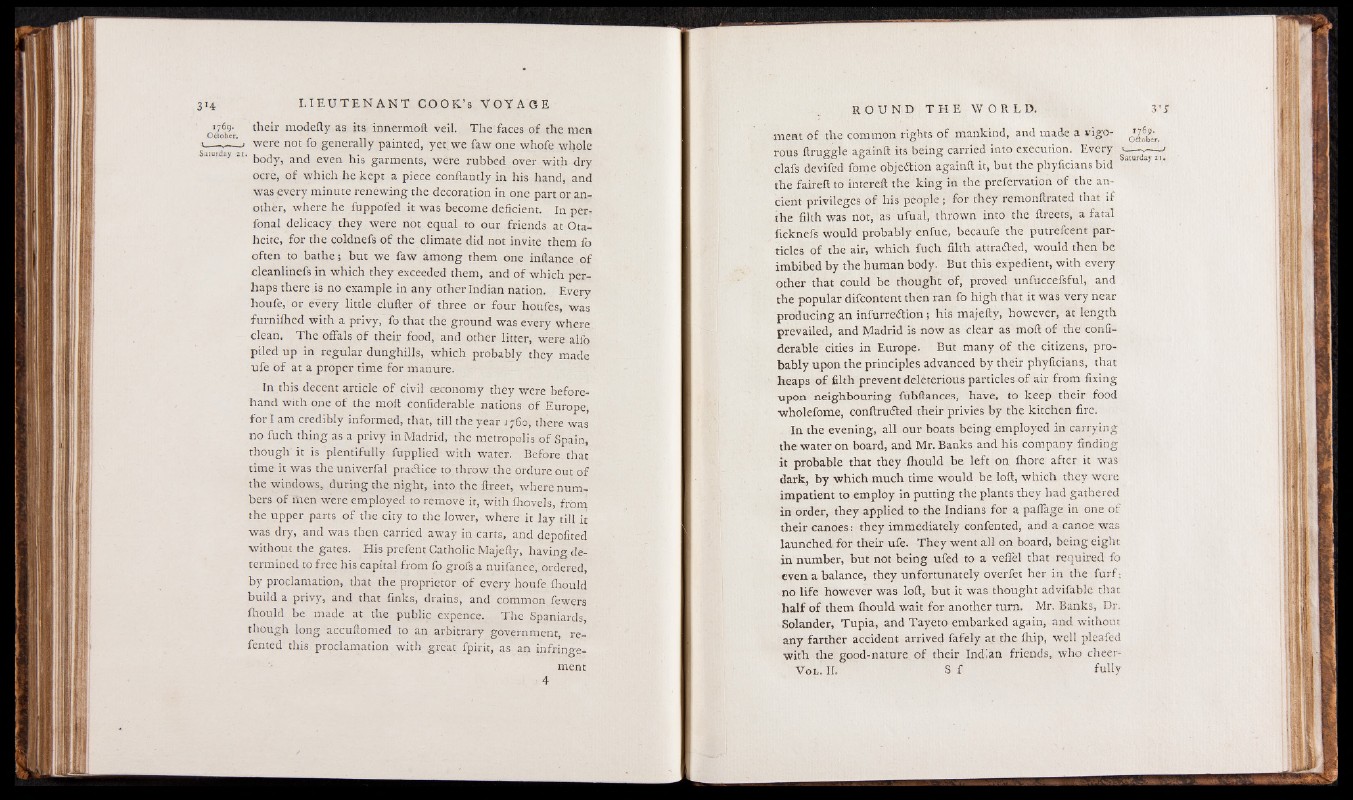
3'4
1769- their modefty as its innermoft veil. The faces of the men
October, _ . .
'— ^— I were not fo generally painted, yet;we faw one whofe whole
atur ay jJocjy) and even his garments, were rubbed over with dry
ocre, o f which he kept a piece conftantly in his hand, and
was every minute renewing the decoration in one part or another,
where he fuppofed it was become deficient. In per-
fonal delicacy they were not equal to our friends at Ota-
heite, for the coldnefs of the climate did not invite them fo
often to bathe; but we faw among them one inflance of
cleanlinefs in which they exceeded them, and of which perhaps
there is no example in any other Indian nation. Every
houfe, or every little duller of three or four houfes, was
furnifhed with a privy, fo that the ground was every where
clean. The offals of their food, and other litter, were alfo
piled up in regular dunghills, which probably they made
ufe of at a proper time for manure.
In this decent article of civil ceconomy they were beforehand
with one of the moft confiderable nations of Europe,
for I am credibly informed, that, till the year 1760; there was
no fuch thing as a privy in Madrid, the metropolis of Spain,
though it is plentifully fupplied with water. Before that
time it was the univerfal pradice to throw the ordure out of
the windows, during the night, into the ftreet, where numbers
of men were employed to remove it, with Ihovels, from
the upper parts of the city to the lower, where it lay till it
was dry, and was then carried away in carts, and depofited
without the gates. His prefent Catholic Majefty, having determined
to free his capital from fo grofs a nuifance, ordered,
by proclamation, that the proprietor of every houfe fhould
build a privy, and that finks, drains, and common fewers
fhould be made at the public expence. The Spaniards,
though long accuftomed to an arbitrary government, re-
fented this proclamation with great fpirit, as an infringement
merit of the common rights of mankind, and made a vigo-
rous ftruggle againft its being carried into execution. Every
clafs devifed fome obje&ion againft it, but the phyficians bid
the faireft to intereft the king in the prefervation of the ancient
privileges of his people; for they remonftrated that if
the filth was not, as ufual, thrown into the ftreets, a fatal
ficknefs would probably enfue, becaufe the putrefeent particles
of the air, which fuch filth attra&ed, would then be
imbibed by the human body. But this expedient, with every
other that could be thought of, proved unfuccefsful, and
the popular difeontent then ran fo high that it was very near
producing an infurredtion; his majefty, however, at length
prevailed, and Madrid is now as clear as moft of the confiderable
cities in Europe. But many of the citizens, probably
upon the principles advanced by their phyficians, that
heaps of filth prevent deleterious particles of air from fixing
upon neighbouring fubftances, have, to keep their food
wholefome, conftrudted their privies by the kitchen fire.
In the evening, all our boats being employed in carrying
the water on board, and Mr. Banks and his company finding
it probable that they fhould be left on fhore after it was
dark, by which much time would be loft, which they were
impatient to employ in putting the plants they had gathered
in order, they applied to the Indians for a paflage in one of
their canoes: they immediately confented, and a canoe was
launched for their ufe. They went all on board, being eight
in number, but not being ufed to a veflel that required fo
even a balance, they unfortunately overfet her in the furf{
no life however was loft, but it was thought advifable that
half o f them fhould wait for another turn. Mr. Banks, Dr.
Solander, Tupia, and Tayeto embarked again, and without
any farther accident arrived fafely at the fliip, well pleafed
with the good-nature of their Indian friends, who cheer-
Voi.. II. S f fully